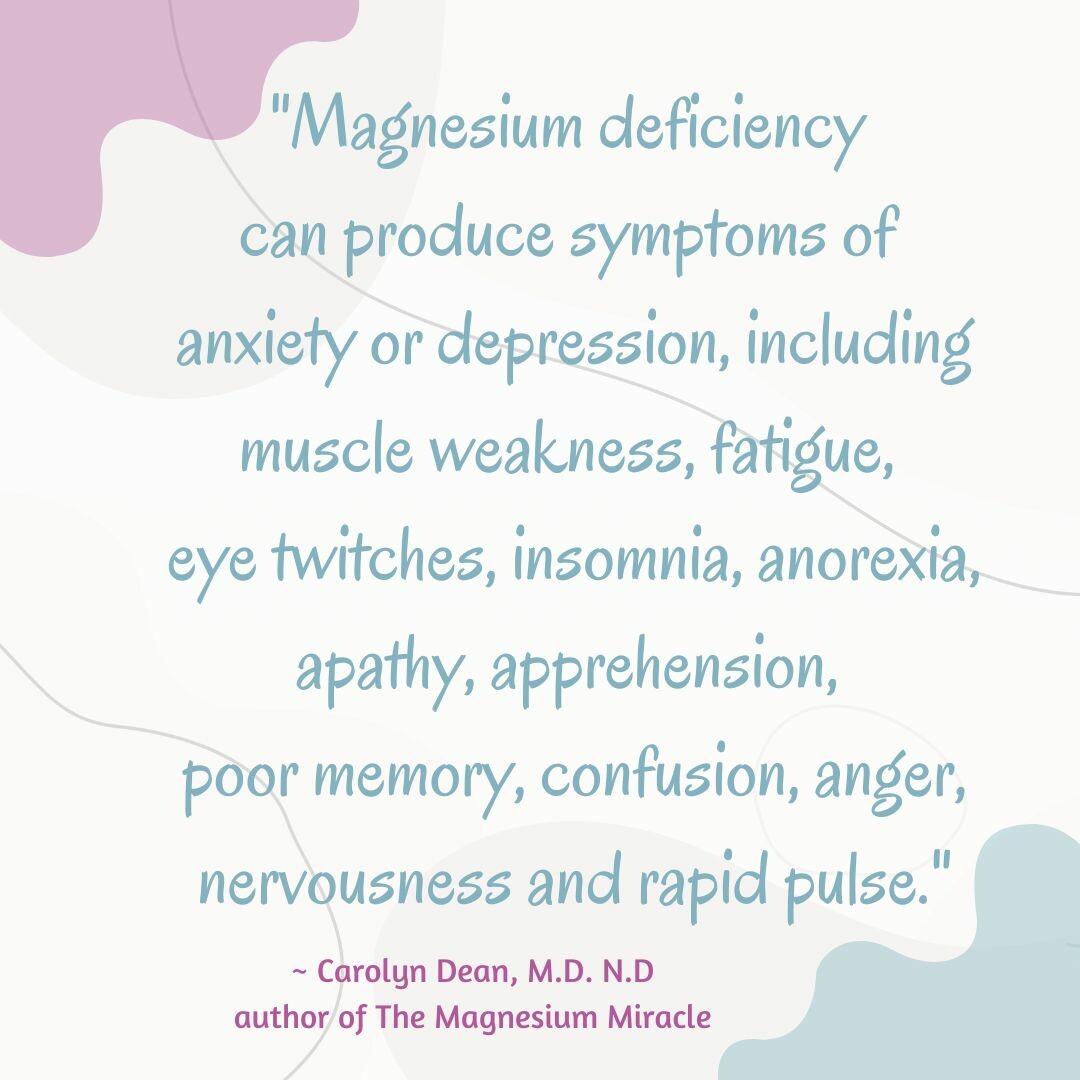Is it possible that you are among the 80% of people who are deficient in magnesium?
Magnesium is often referred to as the “master mineral” and for very good reasons! Magnesium is necessary for the proper functioning of EVERY cell in our body. This is one of the reasons why so many health issues can be traced back to a lack of adequate magnesium!
Are you experiencing any of these common SIGNS OF MAGNESIUM DEFICIENCY?
| Headaches, chronic migraines | Constipation, IBS |
| Insomnia / Sleep issues | Muscle weakness, Cramps, twitching, spasms |
| Heart arrhythmias, rapid heartbeat | Numbness and tingling |
| Irritability | Fatigue (physical, emotional, mental) |
| Anxiety / Depression | Confusion, poor memory |
| Mood swings | Restless leg syndrome |
| Osteoporosis | Tooth cavities |
| Elevated blood pressure | Depressed immune system |
INTERESTING FACT:
Magnesium is needed for calcium absorption. Too much calcium can interfere with magnesium absorption.
It has long been known that too much stress increases the risk of heart attack. Interestingly, stress causes our bodies to burn through magnesium. A resulting lack of adequate magnesium leads to reduced energy production within the heart and ultimately destruction of heart tissue. Clues that your heart might not be getting enough magnesium are heart flutters, palpitations, and elevated blood pressure.
INTERESTING FACT:
ANXIETY AND DEPRESSION
 Anxiety… pounding heart, shortness of breath, shaking, sweats, dizziness, nausea, numbness, feeling like you are dying… it is possible that something as simple as a mineral deficiency could be at the root of such tormenting symptoms? The answer is YES! One of the functions of magnesium is the release of serotonin in the brain! Times of stress cause our bodies to burn through stores of magnesium and leave us without enough to relax our body and maintain balanced systems. Then when faced with any kind of stressor, there isn’t enough magnesium remaining to relax or calm your body and a cascade of symptoms begins. Maybe you're just low on this amazing mineral!
Anxiety… pounding heart, shortness of breath, shaking, sweats, dizziness, nausea, numbness, feeling like you are dying… it is possible that something as simple as a mineral deficiency could be at the root of such tormenting symptoms? The answer is YES! One of the functions of magnesium is the release of serotonin in the brain! Times of stress cause our bodies to burn through stores of magnesium and leave us without enough to relax our body and maintain balanced systems. Then when faced with any kind of stressor, there isn’t enough magnesium remaining to relax or calm your body and a cascade of symptoms begins. Maybe you're just low on this amazing mineral!
INTERESTING FACT:
For every molecule of sugar you consume, it takes 56 molecules of magnesium for your body to process it.
PMS
Magnesium is great for any type of cramps, including “Charlie horse” leg cramps, cramps from exercise and especially menstrual cramps. Supplementing with magnesium, vitamin B6 and evening primrose oil has been shown to help with many symptoms of PMS, including irritability, anxiety, fatigue, tension, nervousness, insomnia, water retention, tender breasts and depression.
SOURCES OF MAGNESIUM
Avocado
Nuts: almonds, pecans, cashews, brazil nuts
Seeds: pumpkin, flax
Dark green vegetables: spinach, swiss chard, broccoli, Brussel sprouts
- Fatty fish (Salmon, Mackerel)
Dark chocolate (the darker the better! Aim for at least 70%)
Legumes: beans, chickpeas, lentils
"I feel it is so important to educate yourself about the benefits of Magnesium and what forms are indicated for what conditions. It is my recommendation that we supplement to at least the daily recommended amount of 350 - 400mg to prevent deficiency.
~ Dr. Barb Woegerer, ND
MAGNESIUM SUPPLEMENTS
There are many things that can deplete our magnesium stores, making supplementation important… these include stress, intense physical activity, caffeine, sugar, alcohol, diuretics and birth control pills to name a few. Magnesium supplements pose very little risk for side effects of toxicity, so many healthcare professionals recommend that adults supplement regularly to prevent deficiency and to replenish magnesium. However, taking any supplement in high does can create an imbalance in other nutrients, so be sure to consult your medical professional before considering large amounts of magnesium or any other supplement.
Focus on quality! Adding magnesium rich foods to your diet is your best first choice… nature has packaged magnesium rich foods with all the complimentary and balancing nutrients that your body needs! When supplementing, start low and slow and always choose a quality supplement.
Magnesium supplements come in many forms which can be quite confusing. Which one is best for you? Let me make it simple for you! Click HERE to access my free quick reference guide that lists common forms of magnesium and their main benefits so you can choose which is best for you!














2 Comments